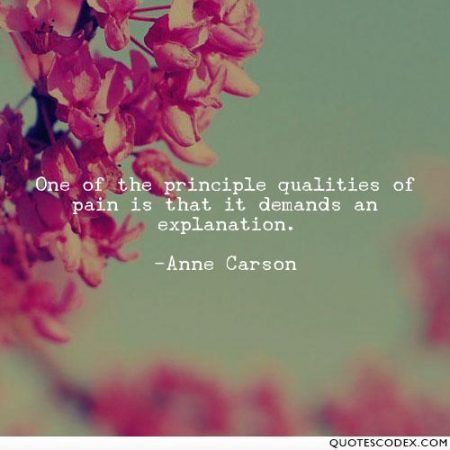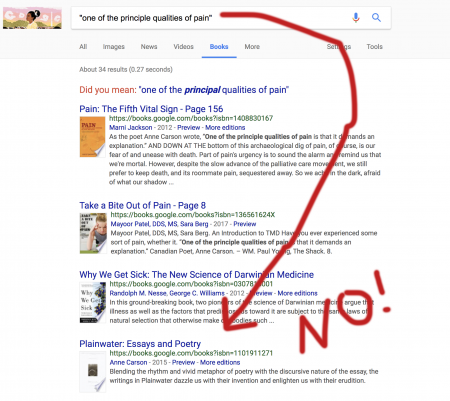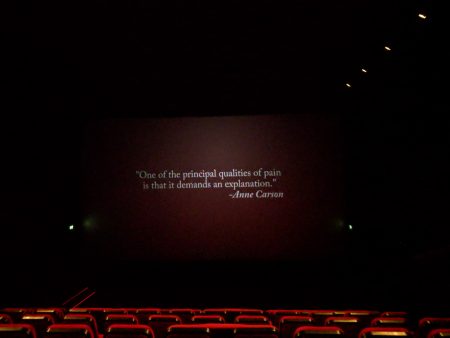 Back to selection
Back to selection
Notes on Real Life
Adventures in Non-Fiction Storytelling. by Penny Lane
Notes on Quotes (Or, The Problem of Quotation, Authorship and Authority)
 The Pain of Others
The Pain of Others Part 1: Notes on a Quote
Like all great adventures, it began with a grammar dispute.
In preparation for the film festival premiere of my film The Pain of Others, I was recently preparing the online edit. The online edit is a sort of crossing-the-Rubicon moment, primarily marked by the dawning horror that the time has come to accept all of your artistic choices because there’s no turning back from them now. (No really, the film is great.)
One of the things on my to-do list was to check the quotation serving as epigraph. The quotation was:
“One of the principle qualities of pain is that it demands an explanation.” –Anne Carson
I had come across this quotation numerous times while researching my film, which concerns a controversial and confusing illness called Morgellons. Tens or even hundreds of thousands say they have it, but most doctors and researchers say Morgellons is not a medical disease at all but a psychogenic disease. This is a matter of some dispute; a small number of peer-reviewed papers suggest the mainstream has it wrong. I am not in a position to evaluate the quality of these studies, and while I deeply care about the right answer, my film is not an attempt to find it.
Rather, The Pain of Others is a work of media archeology, a compilation film made entirely of YouTube videos created by Morgellons sufferers in which they share in excruciating and uncomfortable detail the truth of their experiences. The film leaves the etiological question aside to ask: When doctors send you away, to whom do you turn for help? When suffering has no explanation, what rushes to fill the void? How does false information spread on the internet? If a supportive and loving community forms around a shared delusion, can that be a good thing? What do you do in the face of someone else’s pain if you believe the pain stems from a delusion?
Anyway, back to the epigraph. My big problem was that The Pain of Others had been accepted into Rotterdam and it was time to print the DCP, but I didn’t think the spelling of “principle” was right, and neither did my producer. My producer, Gabriel Sedgwick, has many excellent qualities, but it is possible we work together mainly due to a shared belief in the value of correct spelling.

Photo Jeroen Mooijman
As we all learned (or should have learned) in school, the word “principle” is a noun, whereas “principal” can be a noun or an adjective depending on usage. In this example, the word “qualities” is being modified with an adjective, and “principle” is never an adjective. It had to be “principal.”
Yet it seemed that Anne Carson spelled it “principle.” And who am I to argue with Anne Carson?
One of the principle qualities of pain is that it demands an explanation. — Anne Carson

I couldn’t remember where I had first come across this quote, only that I know I’ve read it multiple times. So I googled it. Who am I to argue with internet quote sites like AZQuotes, QuoteFancy and QuotesCodex (as seen above)?
The few people on the internet providing a citation said it was in Plainwater. But it’s not in Plainwater. I have driven myself crazy proving this point, because on some basic level I really do believe that if people on the internet say something is true, it must be true.

I am struggling right now to not pick up that book and check one more time. But I swear, it’s not in Plainwater.
I know someone who knows Anne Carson, and so I managed to get the question to her directly. She charmingly replied:
“i have no idea as plato says we wrote things down in order to forget them”
I tried a lot of other things, but you get the idea. I can’t find it. Eventually, Gabriel and I agreed since I couldn’t find the citation anyway, we should fix the goddamn spelling. And so into the film it went: a possibly made-up quotation, attributed by people on the internet to Anne Carson, sometimes incorrectly cited as being in Plainwater, as corrected by pedants on a deadline:
“One of the principal qualities of pain is that it demands an explanation.” –Anne Carson
A few days after the DCP shipped to Rotterdam, my friend Jean sent me the Anne Carson poem “Mardi.” It is a beautiful poem. It opens: “A primary characteristic of pain is its demand for an explanation.” Oh, for fuck’s sake.
Does the existence of this quotation mean the one immortalized in my DCP was taken from Anne Carson and rewritten by, like, whomever is in charge of producing inspirational memes? I have no idea. Maybe she wrote or said the other line, too. The whole thing makes me nauseous.

I think this story is instructive, not only because it’s an opportunity to lecture the half-dozen people who read my column on a petty grammar issue, but because it demonstrates in some small and stupid way the difficulty of finding out the truth about even the smallest thing.
And if you’ll permit me a slightly forced transition, the story of my quotation allows me to say something about the problem of quotation more generally.
All art is quotation. The author quotes. Some types of quotations demand a citation, others do not. Sometimes she forgets whom she is quoting, or that she is quoting at all. All of this can get a lot more complicated that it may seem upon first glance.
Part 2: Notes on Quotation, Authorship and Authority
Hey! You may have heard that a fellow named Michael Wolff recently published a book!
Apparently based on 200 interviews with campaign and White House staffers, Fire and Fury was criticized by some as being “full of suggestions and half-truths that Wolff treats as fact.” But what does it mean, to present a rumor as a fact? For the sake of argument, let’s put to the side any accusations that Wolff is just making shit up1 and assume that everything in this book represents something someone said, that the book should be understood as “a compendium of gossip Wolff heard.” In other words, a collection of quotations.
What some people find objectionable is not that the book is made of quotations — doing 200 interviews with people close to a story seems like a reasonable way to find out what the story is == but that Wolff, in his effort to write a compulsively readable text, fails to signpost when and why you should believe what you’re reading.
Consider two short examples, both taken from the New York Magazine excerpt (which I did read, all googly-eyed rubbernecking and righteous satisfaction that, yup, it is as bad as I think it is).
“I can be the most famous man in the world,” he had told his aide Sam Nunberg at the outset of the race.
There are no footnotes. So, do I interpret that sentence, which includes a direct quote (signposted by quotation marks), to mean that Sam Nunberg told Michael Wolff in an interview that Trump said that? Or that someone said that someone said that Trump said something like that to Sam Nunberg? Wolff says he has tape of all his interviews; one assumes if it came to a libel suit or something, he’d pull them out and he feels he is covered.
But I’m not a lawyer, I’m a reader who wants to know if I can trust the writer. Nonfiction depends on this kind of trust to function.
Trump did not enjoy his own inauguration.
No quotation marks. No “Some people say…” type of bracketing. This seems to be an example of Wolff trusting his own authority to present “a version of events I believe to be true” because of “a consistency in accounts and through sources I have come to trust.” This is not a scandal; this is the job of the author.
We are not stupid. We don’t really want or need every statement to begin and end with caveats: “some people say…” or “you decide which of these conflicting interview subjects to believe” or “I have decided which version of events to trust because…” First of all, it’s not very elegant — and moreover, we want and need the author to assert their authority. Authority is the proper domain of the author. It’s a book, not a library. It’s a film, not a video archive.
But in nonfiction, we also need the author to tell us why we should trust them, or their authority erodes. Footnotes help. Telling stories that make logical sense, that don’t strain the credulity of the audience, helps. Keeping the audience entertained, flattered and pampered, I am certain, helps most of all.
The problem is it’s wicked hard to write with any style or grace when you’re worrying yourself over every single sentence. Trust me, I would know. Asserting my authority is, for me, the hardest part of the job. I write, “Gravity is a fact.” And then I freak out: wait, is gravity a fact? Commence an hour of internet research. Even though after this agonizing detour I’m pretty sure it’s safe to say gravity is a fact, I’ve convinced myself I might be wrong. I decide to use a different example. But hang on, let me just make sure when I say, “water is necessary for human life” there’s no chance I’m wrong about that…2
But back to my problem quote, and my film, and the problem of quotation.
In nonfiction film, text on screen is interpreted as the author speaking with her fullest authority. It has the same authorial register as the voice of a narrator. Now, if one of my subjects had quoted Anne Carson, I may not have even checked to see if that was true. It’s a different kind of quotation: in quotation marks, with an on-screen citation. Since the content is not libelous or dangerous in any way, it’s less of my problem if it’s wrong. But if I begin my film, asserting all the authority I have, with a false quotation — why should anyone trust me with all the rest of it?
Like any compilation film, The Pain of Others highlights its status as a collection of quotations, presented without (much) comment. It is a sort of twin to Our Nixon, in which I did the same thing. I do not believe that all, or even most, of the quotations in my film contain factually accurate statements. But the quotations themselves are true, and my viewer can clearly discern my citation in every single case.
Well, I guess, except for the epigraph.
1. [Full disclosure: I have not read the whole book and am using this example simply because I expect you will be familiar with it. ]↩
2. [One time I googled, “Do people expect journalistic integrity from a column?” (And then I googled, “definition of journalistic integrity.”). There are a lot of people who seem to find it easy to say, “Hey, I think XYZ!” — sometimes based on like, no information, as far as I can tell — “listen to me as I say it forcefully!!!” And it seems there are infinitely more people who fucking love it. Including, um, me. I love polemics. I love writers who declaim, who spout aphoristic brilliance with clarity and power. I just have a hard time standing in that place. I don’t know if I can or even want to. So why do I have a column? A column is above all meant to be a place where an author says short, simple, powerful things you can skim in 2 minutes and share on Facebook. I believe my experiment in trying that on for size has failed completely. I suffer from an unreasonable fear of being wrong, and I don’t trust myself consistently and deeply enough to expect readers to trust me as a matter of course. Luckily there are forms of writing and speaking and making art in which I am more comfortable. ]↩
